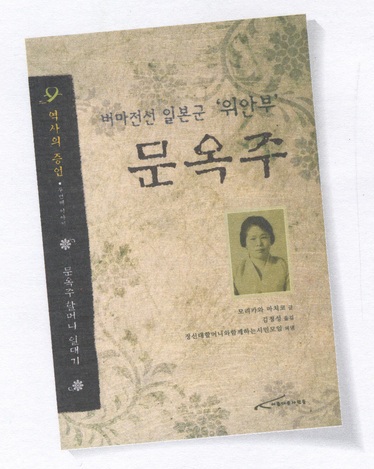Posted on : Jan.9,2018 17:53 KST
 |
|
The testimonial of former comfort woman Mun Ok-ju documenting her experiences in Myanmar during World War II. (Daegu Citizens Forum for Halmuni)
|
Google spokesman apologizes after search results referred to Mun Ok-ju as a prostitute
 |
|
The testimonial of former comfort woman Mun Ok-ju documenting her experiences in Myanmar during World War II. (Daegu Citizens Forum for Halmuni)
|
The job section on Google’s biographical listing about the late Mun Ok-ju, former comfort women for the Japanese imperial army, listed her as a “prostitute” until a number of complaints caused the search engine to delete the listing altogether. Until about 4 pm on Jan. 8, a Google search of Mun Ok-ju showed her name, the dates of her birth and death, and the word “prostitute.” The word “prostitute” is one of several expressions used by the Japanese far right to deny the compulsory nature of the mobilization of the comfort women.
After a flurry of objections from the Korean Council for the Women Drafted for Military Sexual Slavery by Japan (Jeongdaehyeop), as well as by ordinary internet users, Google took down the “knowledge graph” providing biographical information about Mun Ok-ju at 4 pm.
“Google search results are produced automatically by algorithms, and there are unfortunately cases in which this produces inaccurate information. We would like to apologize for this incident, and the team in question has taken corrective measures,” Google Korea said.
“Google’s ‘knowledge graphs’ are compiled independently by an algorithm that draws upon Wikipedia and major news websites, but the search algorithm is still unstable. Whenever this kind of problem is brought to our attention, we manually correct it,” said a source at Google Korea. The company was reportedly unable to determine why the word “prostitute” was included in Mun’s biographical information.
“We asked Google to correct the mistake after learning about it this morning, but we have yet to receive much of an explanation. We’re planning to complain to figure out why such a thing happened,” said Yoon Mi-hyang, president of Jeongdaehyeop.
Born in Daegu in 1924, Mun endured two agonizing stints as a comfort woman between 1942 and 1945, in northern Manchuria and in Burma (today known as Myanmar). In 2016, Japanese newspaper Asahi Shimbun reported that Mun’s testimony was consistent with various documents confirmed on the ground in Myanmar. Mun, who had suffered from a chronic condition, passed away in a Daegu hospital in Oct. 1996.
By Lim Jae-woo and Kim Jae-seop, staff reporter
Please direct questions or comments to [english@hani.co.kr]










